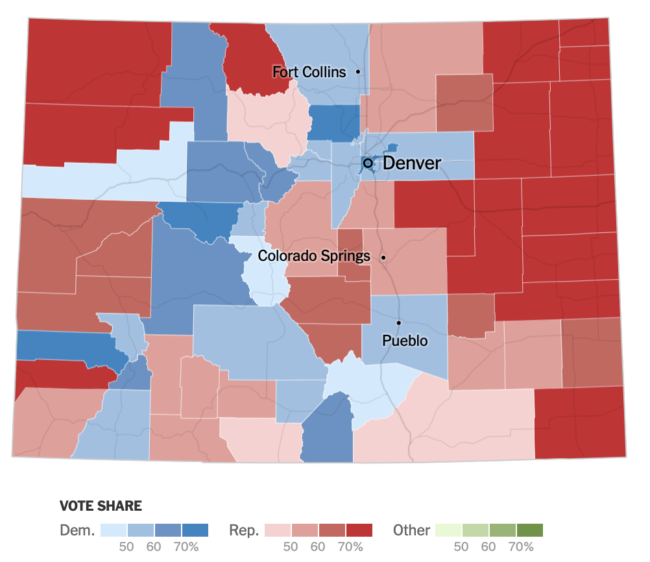
President (To Win Colorado)
See Full Big Line
(D) Kamala Harris
(R) Donald Trump
80%↑
20%

CO-01 (Denver)
See Full Big Line
(D) Diana DeGette*
(R) V. Archuleta
98%
2%

CO-02 (Boulder-ish)
See Full Big Line
(D) Joe Neguse*
(R) Marshall Dawson
95%
5%

CO-03 (West & Southern CO)
See Full Big Line
(R) Jeff Hurd
(D) Adam Frisch
50%
50%

CO-04 (Northeast-ish Colorado)
See Full Big Line
(R) Lauren Boebert
(D) Trisha Calvarese
90%
10%

CO-05 (Colorado Springs)
See Full Big Line
(R) Jeff Crank
(D) River Gassen
80%
20%

CO-06 (Aurora)
See Full Big Line
(D) Jason Crow*
(R) John Fabbricatore
90%
10%

CO-07 (Jefferson County)
See Full Big Line
(D) B. Pettersen
(R) Sergei Matveyuk
90%
10%

CO-08 (Northern Colo.)
See Full Big Line
(D) Yadira Caraveo
(R) Gabe Evans
52%↑
48%↓

State Senate Majority
See Full Big Line
DEMOCRATS
REPUBLICANS
80%
20%

State House Majority
See Full Big Line
DEMOCRATS
REPUBLICANS
95%
5%
 February 21, 2019 02:44 PM UTC
February 21, 2019 02:44 PM UTC 6 Comments
6 Comments

The Western Slope has changed greatly during the past 30 years, except probably in the issue of water diversions. It's hard to say now that resort and outdoor recreation based counties; Eagle, Summit, Gunnison, Pitkin, San Miguel, La Plata, Routt; have a lot in common with the more rural counties like Delta or Rio Blanco. Even in far right Moffat County, Craig has become a bedroom community for Steamboat Springs.
I guess the nutters out in Grand Junction haven’t gotten their stagecoach delivery for awhile? . . .
. . . So sorry folks, Windsor is now the (new) capitol of Colorado crazy!
(First they steal your water, then they make off with your tin foil . . .)
Poor Windsor. It's a quaint, cozy little town and doesn't deserve to be Tinfoil Capital.
Club 20 has become a pay to play organization, dominated by voices with money. Those who pay higher dues get more votes, its that simple. Only the top tier memberships get votes on Executive Board, per the member form and information here.
Also, the above map is instructive, but if one looks at a layer below that even, the story is even more stark. In the 2018 cycle most counties on the West Slope — even those that stayed "red" — still moved significantly toward the Democrats over 2016. Delta County moved 6 points in that direction.
Club 20 made itself irrelevant.
I don’t hate rural voters.
I just don’t care about them as their numbers are too minuscule to matter.
I will only care when it comes to rounding up Trump voters for their extended stay in FEMA reëducation camps.
The map is informative. It would be even MORE informative if the counties were outlined and then there was a red or blue (or other color for other parties) dot for every 1,000 or 5,000 voters in the race for governor.
I appreciate the desire to be relevant to the outcome, to have some sense the candidates are working to understand and appeal to the voters in your area and in your particular niche. But the harsh reality is Club 20 tried to convince people of their relevance, highlighted their claim by blowing up the magnitude of "the mistake," and then lost.